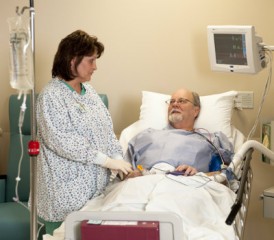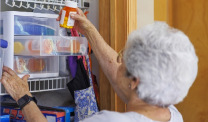Caring for a Loved One Confined to a Bed
Cancer & CaregivingWritten by Lorraine Kember | Edited By Walter Pacheco

Mesothelioma and other cancers often weaken your loved ones to the point where they become bedridden – a burden for them and their caregiver.
Confined to a bed for 24 hours a day deprives the person of the daily activities that took their mind off their condition, or provided a sense of independence like showering. It also means they could suffer bedsores, a potentially deadly side effect of limited mobility.
For you as the caregiver, it’s an added responsibility because it means you have to learn how to wash your loved one, pay special attention to keeping their bed clean and fresh, and find the right clothing for them to wear while confined to their bed.
When I was caregiving for my husband Brian during his mesothelioma illness, I learned how to provide him care during moments when he had to remain in bed.
Bathing Cleanses Body, Mind
Feeling clean and refreshed is important to the health and well-being of everyone, and we all know how good it feels to have a nice shower or a long soak in the bath tub.
Unfortunately, not everyone can enjoy these simple pleasures. If your loved one has mesothelioma, the time may come when they are unable to move from their bed to shower or bathe themselves. While a bedridden person is less active, it doesn’t mean they shouldn’t bathe regularly.
Daily bathing is necessary for their hygiene and keeps them feeling clean and comfortable – sensations that also lift their spirits. I always noticed how much better Brian felt after I bathed him, and changed him into fresh clothes each day.
If your loved one is confined to bed, and cannot bathe or shower themselves, you can help by bathing them in bed, also known as a bed bath.
A bed bath may seem a daunting task for the first-timer, but it’s a relatively simple exercise, and with a little knowledge, you will be able to easily perform this service.
Keeping a Fresh Bed
Clean bedding is also very important to the health and well-being of your loved one. Change the sheets and pillowcases as often as you can. If possible, rotate the mattress to ensure that it wears out evenly.
A fitted, plastic sheet over the mattress and under the bottom sheet will protect the mattress from spills or any other accidents.
If your loved one is able to stand on their own, place a chair nearby and help them into it. Their assistance will make changing the bed easier. However, you can still make the bed with them on it.
Making an Occupied Bed
If the person you care for is in a hospital bed and is mobile, they can hold the rails for support as they lie on either side to accommodate the changing of the bed linens.
If the bed has no rails for support, you will need some assistance. Ask a family member or friend to help you by supporting your loved one on each side.
What to Wear in Bed
Just because the person you care for is confined to bed doesn’t mean they can’t change their pyjamas.
They may enjoy wearing a T-shirt and comfortable trousers or shorts depending on the weather during the day. Wearing regular clothing can lift their morale and make them feel less like a patient. Any loose clothing can be worn, but it’s best to choose clothes that are easy to get on and off.
People with mesothelioma might sense temperature changes differently than their caregivers. Don’t be afraid to ask your loved one how they are feeling. Follow their lead as to what makes them comfortable and what does not.
When helping them choose what they want to wear in bed, look for loose shirts that fit easily over the head and arms. Trousers with an elastic waistband are the best.
Brian liked to wear his favorite shirts during the day, and only put on his pyjamas before heading to bed. As the mesothelioma progressed, he suffered from excessive sweating, and I had to help him into a clean shirt several times a day.
Preventing Bedsores
People who are bedridden can develop bedsores, also called pressure sores and pressure ulcers. These are injuries resulting from prolonged pressure on the skin. They are often very painful, and can become infected.
Bedsores can occur in a number of areas on the body including:
- Back of the head
- Shoulders
- Lower Back
- Heels
- Buttocks
- Hips
Changing a person’s position on the bed regularly can help prevent bedsores. If your loved one is able to move freely, encourage them to rotate the way they are resting at least every two hours. If they are immobile, you will need to assist them. Talk to your district nurse to find out how you can move your loved one without causing them or yourself injury.
Physical aids such as pressure-relieving mattresses and elbow and ankle pads are also available. Ask your doctor, local clinic or hospital where you can obtain these items.
Check their skin daily, and inspect any areas that are particularly dry. Gently rub moisturizing cream into these areas to replenish the skin. Watch how much lotion you apply because too much cream on the skin can also result in bedsores.
Light Massages Can Be Helpful, Soothing
While massaging bony, sore or inflamed areas is not recommended because the skin there is very delicate, caregivers can gently rub other parts of your loved one’s body using a suitable moisturizing cream.
Light, nongreasy moisturizers work best. Almond or vegetable oil is also suitable, and these also prevent the skin from becoming dry.
You also don’t have to limit your massage to the head, neck and back. Try massaging their feet and hands. It brings equal relaxation.
Brian loved when I massaged his back and shoulders. It never failed to bring him comfort. I did this for him almost every day, and I loved doing it.






